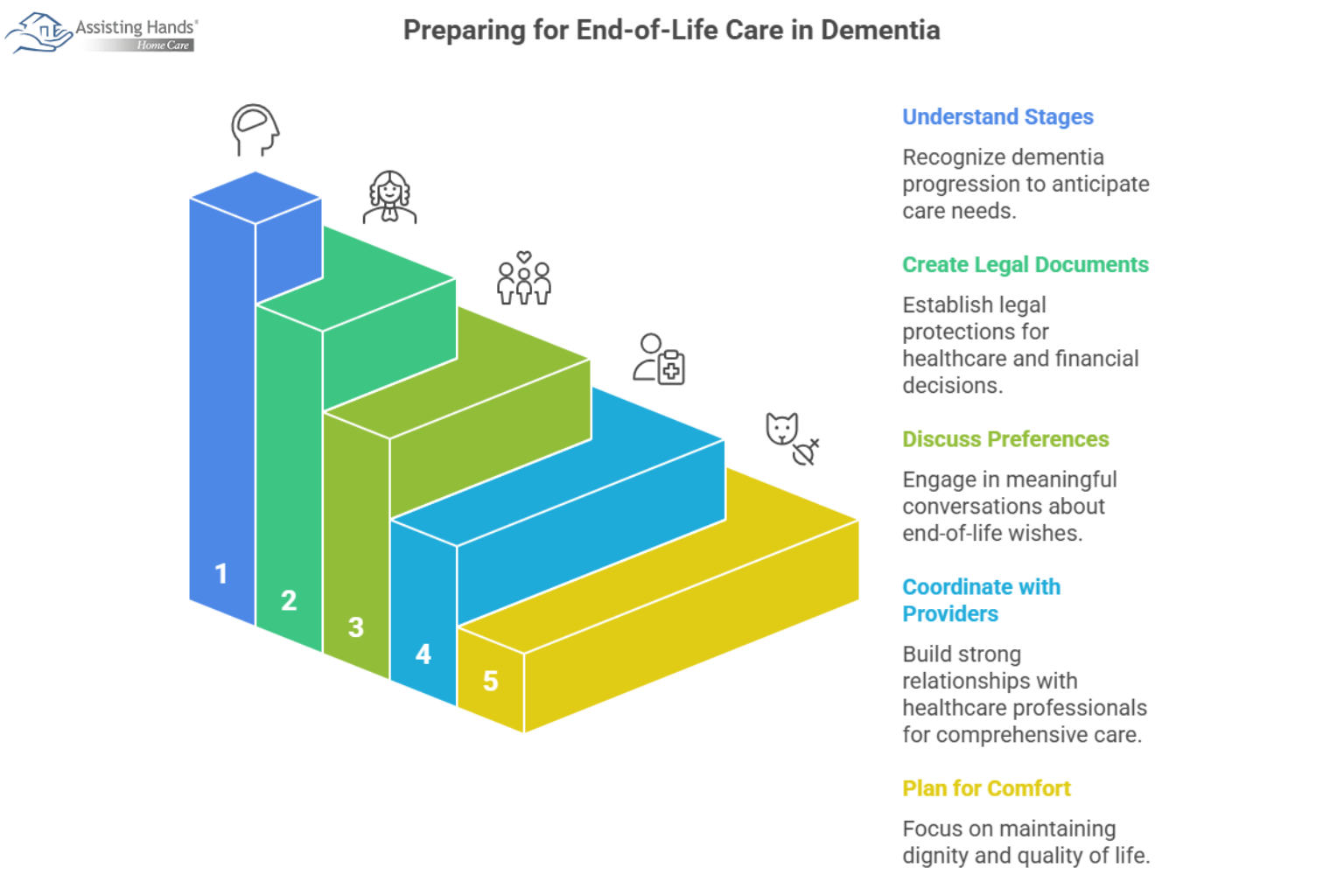
Table of Content
When a senior loved one receives a dementia diagnosis, families face countless challenges throughout the disease progression. Preparing for end-of-life care requires thoughtful planning, open communication, and understanding of what to expect as the condition advances.
Understand the Stages of Dementia Progression
Dementia typically progresses through distinct stages, each presenting unique care needs and considerations. Recognizing these stages helps families prepare appropriate interventions and support systems.
- Early stage
- Mild memory loss and confusion
- Difficulty with complex tasks
- Changes in judgment and decision-making
- Increased anxiety or depression
- Middle stage
- Significant memory loss affecting daily activities
- Difficulty recognizing family members
- Increased confusion about time and place
- Need for assistance with personal care
- Late stage
- Severe cognitive decline
- Limited verbal communication
- Physical complications such as difficulty swallowing
- Complete dependence on caregivers for all activities
Understanding these stages allows you to anticipate your loved one’s needs and make informed decisions about care preferences while he or she can still participate in planning discussions.

Create Advanced Directives and Legal Documents
Establishing legal protections early in the dementia journey ensures your loved one’s wishes are honored when he or she can no longer communicate his or her preferences. These documents provide essential guidance for healthcare decisions and financial management.
Essential legal documents include:
- Advanced healthcare directive – Outlines specific medical treatments your loved one wants or refuses
- Durable power of attorney for healthcare – Designates someone to make medical decisions
- Financial power of attorney – Authorizes someone to manage financial affairs
- Living will – Specifies end-of-life care preferences, including life-sustaining treatments
Work with an elder law attorney who understands dementia-related challenges to ensure documents meet state requirements and address specific concerns. Review and update these documents regularly as the condition progresses and circumstances change.
If your loved one gives you medical power of attorney, you’ll have the legal authority to hire a home caregiver for him or her. When researching agencies that provide home care services, Fremont families are usually looking for flexible care plans, compassionate and highly trained caregivers, and 24/7 availability. Whether you need respite care to take a break from your caregiving duties or your senior loved one needs around-the-clock assistance at home, you can rely on Assisting Hands Home Care.
Discuss Care Preferences and Values
Having meaningful conversations about end-of-life preferences becomes crucial before communication abilities worsen significantly. These discussions should focus on values, comfort measures, and quality of life priorities rather than specific medical procedures.
Important topics to address include:
- Preferred location for end-of-life care (home, hospice facility, hospital)
- Attitudes toward life-sustaining treatments such as feeding tubes or ventilators
- Pain management and comfort care priorities
- Religious or spiritual practices that provide comfort
- Funeral or memorial service preferences
Approach these conversations during calm moments when your loved one feels most alert and comfortable. Consider involving other family members, spiritual advisors, or healthcare providers who can offer support and guidance throughout these discussions.
Many seniors prefer aging in place over moving to assisted living facilities. If your senior loved one needs assistance to remain safe and comfortable while living at home, reach out to Assisting Hands Home Care, a leading home care service agency. Our dedicated in-home caregivers can assist with meal prep, bathing and grooming, exercise, medication reminders, and many other important tasks.
Coordinate with Healthcare Providers
Building strong relationships with healthcare professionals ensures comprehensive care coordination as dementia progresses. Regular communication with medical teams helps families understand treatment options and prepare for changing needs.
- Primary care physician – Manages overall health, monitors medication effectiveness, and coordinates with specialists
- Neurologist or geriatrician – Provides specialized dementia care and tracks cognitive changes
- Social worker – Connects families with community resources and support services
- Hospice team – Offers comfort-focused care and emotional support during end-of-life stages
Schedule regular care team meetings to discuss progression patterns, adjust treatment plans, and address family concerns. Ask about hospice care criteria and enrollment processes before they become immediately necessary.
Plan for Comfort and Quality of Life
Focus on maintaining dignity, comfort, and meaningful connections as the disease advances. Quality of life considerations often matter more than aggressive medical interventions during late-stage dementia.
Comfort measures may include:
- Creating familiar, soothing environments with favorite music or photographs
- Maintaining consistent daily routines when possible
- Ensuring adequate pain management and symptom control
- Facilitating visits from family, friends, and pets
- Providing gentle touch, massage, or aromatherapy
- Honoring cultural or religious traditions that bring peace
Consider enrolling in hospice care when curative treatments no longer align with your loved one’s goals. Hospice services focus on comfort, dignity, and family support rather than prolonging life through aggressive medical interventions.
A highly trained caregiver with experience in caring for seniors with dementia can be a fantastic resource for family members. Even when families have the best intentions, caring for a senior loved one with dementia can be challenging. Fortunately, Assisting Hands Home Care is here to help. We are a leading provider of dementia care. Fremont families can take advantage of our flexible and customizable care plans, and our caregivers always stay up to date on the latest developments in senior care. Reach out to us at Assisting Hands Home Care if you need compassionate professional care for your loved one. Call one of our friendly Care Managers today.







